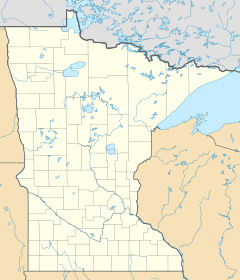Lime Creek (Des Moines River tributary) facts for kids
Quick facts for kids Lime Creek |
|
|---|---|
|
Mouth of the Lime Creek
|
|
| Country | United States |
| State | Minnesota |
| County | Murray |
| Physical characteristics | |
| Main source | Avoca, Minnesota 43°56′42″N 95°39′50″W / 43.9449636°N 95.6638987°W |
| River mouth | Lime Creek, Minnesota 43°57′27″N 95°31′17″W / 43.9574627°N 95.5213937°W |
| Length | 28.6-mile-long (46.0 km) |
| Basin features | |
| River system | Des Moines River |
Lime Creek is a small but important waterway located in the state of Minnesota, United States. It flows for about 28.6 miles (46.0 kilometers) through Murray County. This creek is a tributary, which means it's a smaller stream that flows into a larger river. For Lime Creek, that larger river is the Des Moines River.
Contents
What's in a Name?
Lime Creek gets its name from the type of rock found along its path. The creek bed, or bottom, has a lot of limestone. Limestone is a common type of rock that forms from the remains of ancient sea creatures. It often has a light, chalky appearance.
Where Does Lime Creek Flow?
Lime Creek begins its journey near the town of Avoca, Minnesota. This is where the creek's waters first gather and start to flow. From its source, the creek winds its way through the landscape of Murray County. It eventually reaches its end point, or mouth, near the community also named Lime Creek, Minnesota. Here, its waters join the larger Des Moines River.
Why Rivers Are Important
Rivers and creeks like Lime Creek are super important for many reasons. They provide fresh water for plants and animals. They also help shape the land over many years, creating valleys and carrying nutrients.
Home for Wildlife
Even a small creek can be a home for lots of different creatures. Fish, insects, and small mammals often live in or near the water. Birds might visit the creek to drink or find food. The plants growing along the banks also depend on the water.
Shaping the Land
As Lime Creek flows, it slowly changes the land around it. It can carry away small bits of soil and rock, a process called erosion. Over a very long time, this can create small valleys or channels. It also deposits sediments, which can create fertile areas.
Protecting Our Waterways
Keeping rivers and creeks clean is very important. Pollution from trash or chemicals can harm the wildlife and the environment. People work to protect waterways like Lime Creek so they can stay healthy for future generations. This helps keep the water clean for everyone and everything that depends on it.
 | Mary Eliza Mahoney |
 | Susie King Taylor |
 | Ida Gray |
 | Eliza Ann Grier |


